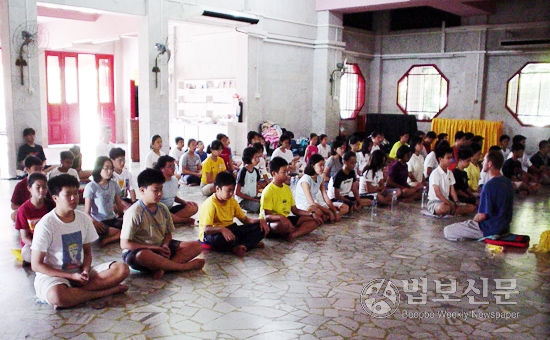이기적인 사고·중독성은 경계해야 할 대상
수행위한 공간으로 활용하는 건 각자의 몫
|
몇 해 전 페이스북에서 꽤 이름난 불교 법사와 친구의 인연을 맺게 되었다. 그녀는 백인혈통의 60대 미국인이었고 그녀가 쓴 책과 가르침은 영어권 불교계에 엄청난 영향력을 갖고 있었다. 물론 그녀는 내가 누군지 알지 못했기 때문에 실질적으로 ‘친구’라고 할 수도 없었지만 그녀에 관한 새로운 뉴스는 나에게 전달되는 매우 긴 뉴스 리스트에 포함되어 있었다. 종종 그녀의 새 소식들은 그녀 자신과 평화, 환희, 달 그리고 자연계의 다른 대상물들이 소재가 되는 ‘하이쿠’(短詩 전통적인 일본의 짧은 시) 형식으로 전해지곤 했다.
처음 나는 이러한 소식들을 그녀의 행복에 대해 내가 함께 기뻐하는 불교 수행, 즉 ‘함께 기뻐함’(喜)으로 활용했다. 그런데 어찌된 일인지 시간이 지남에 따라 정신적으로 지치게 되고 그녀의 글들에 대해 불쾌하게 여기게 되었다. 마침내는 그녀의 글들은 매우 ‘자기중심적’이라는 사실을 깨닫게 되었다. 무아와 상호의존에 대한 통찰을 목적으로 하는 불교 수행의 경력이 40년이나 되는 사람이 ‘매우 이기적’이라는 사실에 너무도 실망했다. 그래서 직접적으로 얼굴을 마주 대하는 관계이면서 매우 저명한 사람이었다면 생각할 수도 없는 일을 벌이게 되었다. 그녀가 제공하는 페이스북 상의 내용들을 모두 ‘보이지 않게’ 처리했다. 사실상 그녀와의 관계를 단절한 것이다.
위의 경우는 약간 극단적인 면이 있기는 하지만 그럼에도 그것은 불교 수행을 하고자 하는 사람들에게 특히 관련이 있는, 페이스북 활용의 한 단면을 일깨워 주었다. 페이스북은 우리가 ‘자아 중심에 관한 관념’을 만들어내고 구축할 수 있는 즉각적인 수단을 제공한다는 것이다. 그런데 그러한 것은 과거에는 명성과 권력을 가진 극소수에게만 가능했던 방법이다. 이에 대한 충동이 항상 나의 내면에 있다는 것을 자각한다.
아이들과 함께 집에 혼자 있기 때문에 외롭다고 느끼거나, 기분이 우울하거나 남들에게서 인정받고 싶어질 때 보여 줄만한 것 또는 나의 감정을 페이스북 친구들에게 전달하고자 하는 생각이 갑자기 떠오르게 된다. 수미는 자기가 만든 닭고기 저녁 요리에 매우 만족해한다”라고 글을 올린다. 페이스북 친구들이 ‘좋아한다’ 또는 긍정적인 댓글을 달아주면 나는 순식간에 좀 더 ‘구분되고 차별화된 수미’를 발견하게 된다.
페이스북, 블로그, 트위터 또는 사회의 관계를 다룬 매개체들이 엄청난 중독성을 갖는 이유가 바로 이것이다. 핵심에는 ‘자기중심(에고 ego) 강화’라는 요소가 내포되어 있기 때문이다. 누군가의 댓글로 인해 나의 생각이 긍정적으로 강화되면 뇌에서는 미묘한 쾌감이 어느 정도 분출되는 것을 느끼게 된다.
본질적인 측면에서 보면 페이스북 사용은 불교의 핵심가치을 훼손할 가능성이 농후하다. 고통(苦)의 현상과 원인, 극복에 대한 자각을 비롯해 핵심 수행체계인 ‘집착을 내려놓는 것’을 상실할 가능성이 크다. 이런 사실을 발견한 뒤 ‘오늘밤 영화를 보게 되어 들떠있다’, ‘달라이라마와 만났다’, ‘고통에 대한 나의 글은 이 인터넷 페이지에 있다’ 등과 같이 무익하고 헛된 글들을 더 이상 올리지 않기로 했다. 더군다나 그런 글들을 올리고자 하는 충동이 일어날 때 ‘왜 자기중심적 사고를 강화할 필요가 있는가’, ‘이 순간 있는 그대로 온전하고 완벽하지 않은 것이 있는가’라고 질문하면서 깨어 있으려고 노력했다. 페이스북 활용은 일상적인 명상 수행의 매력적인 대상이 되었다.
지난달에 있었던 일주일간의 묵언 명상 수행 끝 무렵 나는 나의 페이스북 활용에 대해 곰곰이 생각해 보았다. 일주일간 컴퓨터를 사용하지 않고 페이스북에 글을 올리지 않고 견디었다. 그로부터 해방되어 있었던 것이다. 뉴스 가치가 있는 소수의 글들을 제외하면 새롭게 배운 건 거의 없었고 페이스북 사용의 결과로 내가 향상되거나 어떤 형태로든 변화된 것은 없었다는 사실을 자각했다. 집으로 돌아가면 페이스북 계정을 폐쇄하겠다고 결심했다. 그런데 다음 날 페이스북이 없는 삶을 상상해보니 그것은 아무리 생각해도 삭막하고 격리되어있고 차갑게 느껴졌다. 페이스북을 사용하기 전 몇 해 전에 친구에 대해 궁금한데 연락할 수 있는 방법이 없었는데 어떻게 그러한 마음이 일어나게 되었는지에 대해 생각해보았다.
수없이 여러 번 어떤 사람이 생각이 났고 그들을 보거나 그들과 다시 얘기할 수 있게 되기를 간절히 기원했다. 이제는 이런 친구들과 연락이 되어 그들의 결혼과 출산에 대해 같이 기뻐하는 것을 매우 즐겁게 여기게 됐다. 내가 알고 지냈던 사람이 의사가 되었고 어떤 이는 그들이 꿈꾸던 도시로 이사를 했다는 등등의 사실을 알게 되었다. 그러한 소식을 듣는 것은 매우 기쁜 일이다. 게다가 페이스북은 다른 부모들로부터 지원을 받거나 동료 법우와 가까워지거나 사회의 주장, 쟁점들을 인식하게 하는 수단이 되었다. 한번은 친구들이 어느 친구 부모의 죽음 또는 불의의 병환에 대해 글을 올린다. 이에 여러 동료들이 함께 위로하고 충고하고 같이 걱정해준다.
부처님은 영적인 삶에서 좋은 친구의 중요성에 대해 여러 차례 강조했다.
다문제일 아난존자께서 말했다.
“충실한 우정, 충실한 우의, 충실한 동지애는 영적인 삶의 절반에 해당합니다.”
그러자 부처님께서 답하셨다.
“그렇지 않다, 아난다여! 그렇지 않다, 아난다여! 충실한 우정, 충실한 우의, 충실한 동지애는 영적인 삶의 전부이다.”
페이스북은 현대적이고 세련된 우정의 도구이다. 불교 또한 자기중심적인 생각을 버리고 우리 모두가 상호 의존적이라는 사실을 깨닫는 방법으로서 타인에 대한 자비심을 내는 수행을 발전시켜왔다. 몇 년 전 보스턴에서 지하철을 탔을 때 함께 탄 승객들에게 연민의 마음을 내는 수행을 시도한 적이 있었다. 페이스북은 내가 익히 알아 왔던 사람이든, 연고가 그다지 많지 않은 사람이든 수많은 사람들에게 친절의 마음을 낼 수 있는 기회를 제공해 준다는 사실을 깨닫게 된다.
|
수미런던 듀크 불교공동체 지도법사 simplysumi@gmail.com
번역자 백영일 yipaik@wooribank.com
다음은 영문 원고 전문.
Facebooking is/is not Buddhist
A few years ago, I became “friends” with a famous Buddhist teacher on Facebook. She is a white American in her 60s, and her writing and teaching is tremendously influential in the English-speaking Buddhist world. Of course, we weren’t really friends, as she had no idea who I was, but our new connection put her status updates in my infinitely long News Feed. Often, her updates were in the form of a haiku that involved herself, peace or bliss, and the moon or something else in nature. At first, I used these posts to try to feel some happiness for her happiness, a Buddhist practice called “sympathetic joy.” But over time, I became mentally exhausted and began to resent her posts. Eventually it struck me that her posts were enormously self-promoting. I was terribly disappointed that someone with 40 years of Buddhist practice, all aimed at insight into non-self and interconnection, came across as egotistical. I did what would be unthinkable in a face-to-face interaction and for someone so prominent: I set her feed to “Hide All Posts.” I nearly unfriended her.
The Buddhist teacher’s case is somewhat extreme, but it tipped me off to one quality of Facebooking that is particularly relevant for those seeking to practice Buddhism. Facebook provides an instant way for us “to self,” to create and build a sense of self, in a way that in previous eras only fame and power allowed a very few to do. I see this impulse in myself all the time: when I’m feeling a little isolated, because I am home alone with the kids, or I’m not feeling good about myself, or I just want a little stroke of approval, it suddenly occurs to me to post something clever or to post my feelings. “Sumi is perfectly content with the chicken dinner she just made.” When friends “Like” or comment on my status in a positive way, I feel, for a split second, like a better, more identified Sumi.
This is why Facebook, blogs, Twitter, and other social media are so enormously addictive, because it is at core an exercise in ego. When someone affirms me through a comment, I can actually feel a small squirt of neural pleasure in my brain. For this reason, at a very fundamental level, Facebooking has the potential to undermine a core value in Buddhism, that of humility, and a core practice, relinquishing attachment to self. Once I realized this, I banned myself from posting anything useless or vain, such as “Excited to be seeing a movie tonight” or “Met with the Dalai Lama” or “My article on humility can be read here [website].” Moreover, if the impulse arose to make such a post, I worked to become mindful of why I needed to boost my ego, what in this present moment was not complete and perfect as it is. Facebooking has become a fascinating canvass for meditation in daily life.
Toward the end of a seven-day silent meditation retreat I did last month, I reflected on my use of Facebook. I had survived, and even found relief, from seven days of no computer use and no posting on Facebook. I thought about how, aside from a very few postings on news-worthy articles, I had learned almost nothing new and not grown or changed in any way as a result of using Facebook. I decided that when I got home I would close my Facebook account. The next day, though, I imagined life after Facebook, and somehow it seemed barren, isolated, cold. Why? I reflected on how in the decades of my life before Facebook (some of you reading this probably can’t imagine a pre-internet world), there had been many times when I wondered about a certain friend from years before and had no way of contacting them. Many, many times someone I had cared about would come back into my heart, and I longed to see or talk to them again. In this day and age, I have loved being able to rejoice in the marriages and birth of children of these friends. It has been joyous to see that someone I knew is now a doctor, or another moved to a city of their dreams, and so on. And more than that, Facebook has given me a way to find support from other parents, to connect with fellow spiritual seekers, and to become aware of causes and issues in society. At other times, friends have posted news about the death of a parent or an unexpected illness. Here, many of us come together to provide consolation, advice, and care.
The Buddha spoke many times about the importance of good friends in the spiritual life.
[Ananda said,] “Venerable sir, this is half of the spiritual life, that is, good friendship, good companionship, good comradeship.”
[The Buddha responded,] “Not so, Ananda! Not so, Ananda! This is the ENTIRE spiritual life, Ananda, that is, good friendship, good companionship, good comradeship.”
Facebook is a modern and beautiful means for friendship. Buddhism also has a well-developed practice of generating loving-kindness for others, as a way of reducing ego-centric thinking and remembering how we are all interconnected. When I rode the subways in Boston years ago, I would practice sending loving-kindness to my fellow passengers. I find that Facebook provides the opportunity to send loving-kindness to a great range of people, some of whom I’ve known well and many of whom I have a distant connection to.
In the end, Facebook itself is neither antithetical to Buddhism nor is it Buddhist: it’s simply a tool. As with all tools, it can be used two opposing ways. Facebook can be something that undermines the aims of Buddhism, such as releasing the grip of egotism and reducing distractions in life. And, Facebook can foster the Buddhist meditative practices of sympathetic joy, compassion, and loving-kindness as well as nurture spiritual friendships. In all regards, if a Buddhist brings mindfulness to their use of Facebook, then it certainly is possible to use Facebook as a tool for practice.



